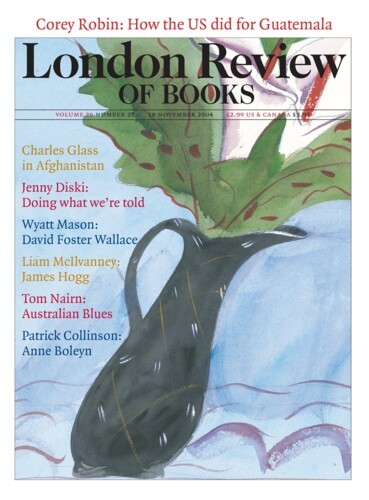There’s a handy website, http://tinyurl.com, that shrinks very long web addresses into very short ones. This is useful when sending hyperlinks by email, as they can get broken up on their way through cyberspace, and so be difficult for the person at the other end to click on: tinyurl.com/53js3, for example, takes you to a map showing the location of the London Review Bookshop; the actual address is http://www.streetmap.co.uk/newmap.srf?x=530255&y=181628&z=0&sv=WC1A+2JL&st=2&pc=WC1A+2JL&mapp=newmap.srf&searchp=newsearch.srf, which I bet you can’t be bothered to type in. If you go to tinyurl.com/1, you will see that the creator of the site is a unicycling enthusiast – committed to minimalism in more ways than one.
By some extraordinary coincidence (oh all right, the odds are so tiny it’s clearly no coincidence at all) tinyurl.com/dick takes you to the homepage of Vice-President Dick Cheney, part of www.whitehouse. gov. In a different universe, it would from January have taken you to a browser error message: ‘This page has expired.’ As things stand, the link will be valid for four more years (assuming the world survives that long). And so will tinyurl.com/cunt, which links, by some extraordinary coincidence, to the homepage of Lynne Cheney, the vice-president’s wife. It’s not very edifying or grown-up, I know, this online equivalent of looking up rude words in the dictionary, but in these dark times one must grab one’s consolation where one can.
In his recent book Dick: The Man who Is President (New Press, £14.99), John Nichols, the Nation’s Washington correspondent, makes a persuasive case for the (by now fairly familiar) idea that the vice-presidency is the real locus of power in the current US administration: Cheney runs the show and pulls the strings while the president pulls faces to distract the public, reassuring the people that their government is in a folksy pair of hands. Nichols begins with a story that pretty much says it all. On 7 February 2001, Robert Pickett fired several rounds from a handgun through the fence surrounding the White House.
Unaware of whether or not a terrorist incident was playing out, secret service agents rushed to the sides of the vice-president and president. They found Cheney working on a speech in his office in the West Wing, surrounded by ringing phones, a buzzing computer and scurrying aides . . . They found George Bush in the White House gym. He was working out.
More paranoid readers may be able to detect some significance in the fact that tinyurl.com/bush sends you not to anywhere on the official White House site, but to a story from the 15 May 2003 edition of the Globe and Mail about an office block in Toronto not being built.
There’s probably a lot of truth in Nichols’s argument, but it’s not clear that truth has much to do with anything when it comes to people’s motives for installing their leaders. The notion that George W. Bush is a figurehead, a mere puppet in the hands of his scheming advisers, needn’t be damaging to the administration. For while it strips the president of apparent power, it also strips him of apparent culpability. Most of the things that Nichols accuses Cheney of aren’t the sorts of thing governments usually like to boast about: funnelling tax-payers’ money into Halliburton, sidelining Congress, giving Oliver North and John Poindexter an easy ride over Iran-Contra. Blaming Cheney absolves Bush, and election-winning numbers of people vote not according to a party’s policies but on a candidate’s personality and character. This is paradoxical, but no more so than claiming to dislike government interference in people’s private lives and voting for a party that’s opposed to abortion and gay marriage (22 per cent of Americans, most of them Bush supporters, gave ‘moral values’ as their primary consideration when voting; 20 per cent said the economy; 19 per cent, terrorism; 15 per cent, the war in Iraq).
Like George Bush, Clare Short has been able to remain aloof from the government she was once part of. This was as much the case when she became secretary of state for international development in 1997, telling the Zimbabweans that ‘my own origins are Irish and as you know we were colonised not colonisers,’ as if her ‘own origins’ were more relevant than her role in government, as it was when she (finally) resigned last year in protest at the invasion of Iraq. In her new book, An Honourable Deception? New Labour, Iraq and the Misuse of Power (Free Press, £15), she gives an insider’s account of what happened in the run-up to the war, and her reasons for leaving the government. She also suggests it would be no bad thing if Tony Blair were to resign. It occurs to me, however, that the prime minister’s opponents who believe he ought to quit are labouring under a misconception: that resignation is still a way of admitting to having done something wrong, or at least to having made a mistake. Short’s departure, like Robin Cook’s, was a sign of probity. If Blair ever does leave voluntarily, it will be in order to demonstrate that he’s the honourable man he thinks he is.
Send Letters To:
The Editor
London Review of Books,
28 Little Russell Street
London, WC1A 2HN
letters@lrb.co.uk
Please include name, address, and a telephone number.

